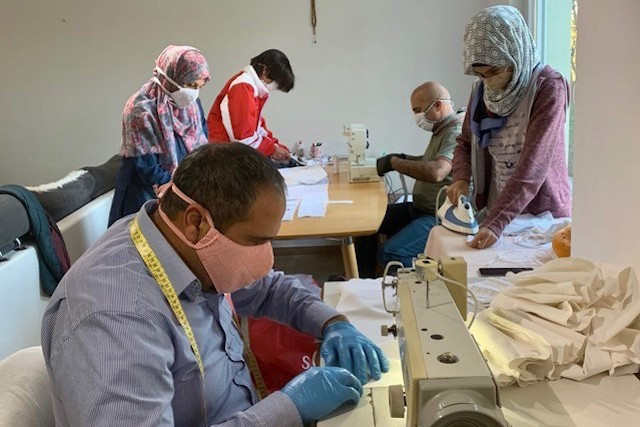The arrival of covid-19 was marked by an outpouring of solidarity in the country. Among the people to jump into action was Mohammed Al-Hashimi, a refugee from Iraq who came to Luxembourg two years prior. He wanted to “give back to Luxembourg what it gave to me” and began sewing masks together with this family. He has since made around 17,000 of them, says former Vianden mayor Gaby Heger, who supported Al-Hashimi in his project.
The masks were handed out to doctor’s offices, hospitals, companies and associations, and even the royal household and the Luxembourg archdiocese. “The fabric for the majority of masks was provided following my appeal on social media,” says Heger.
Al-Hashimi and his family are still sewing but are coping with problems of their own. “The home in which the family rents an apartment has been sold and the new owner needs the whole house. They are searching for a new lease,” says Heger.
Elsewhere, Solidar-IT distributed tablets with videoconference software to nursing homes and other care facilities to alleviate loneliness among residents while relatives weren’t allowed to visit. It handed out 500 devices in 2020 but is now struggling to stay afloat.

Solidar-IT distributed tablets to nursing homes to help people feel less isolated. Photo: Mathias Tricart/Solidar-IT
“We are lacking funds to continue,” says Nathan Mangenot, who initiated the project. “We’ve emerged from this moment of solidarity when we had more support.”
The not-for-profit relies on donations of money or devices, from individuals or companies. But the team of around 20 volunteers aren’t giving up. “We are thinking of ways to collect new funds,” Mangenot says, adding that Solidar-IT would like to expand its offer to people living alone, not in a home.
Good deeds
Restaurant Partigiano offered free coffee to police, first responders and hospital staff during lockdown last year. “We haven’t stopped,” said Alexandre De Toffol. Demand has simply decreased over time, he says, adding that a nurse would still be served a free coffee if they ordered one, even if it is now the restaurant sector that is in need of help.
Demand has also decreased for Luxembourg Scouts, who recently won the European Parliament’s citizen’s award for helping vulnerable people during the pandemic.
Aiming to do a good deed every day, the Scouts ran errands or walked dogs. The project officially stopped in June last year with the end of lockdown, says Raoul Wirion of the FNEL federation. Many volunteers had to go back to school or work. On the other hand, families used the time to get more organised.
The Scouts also wrote postcards to people feeling isolated during lockdown and also during the holidays at the end of the year.
Of the 7,000 people the Scouts supported in total, around a dozen still receive help by the federation, which also helped make, collect and distribute 40,000 masks to some 50 organisations in the country.
Fashion shop Bram was among the companies that supplied the Scouts with masks for distribution to associations in need. “We were able to react rapidly at the time, because we have a studio that could produce the masks,” says director René Weis. Since there is no longer a shortage of masks, the studio is back to doing clothing alterations.
Similarly, the Mansfeld distillery provided 4,000 litres of untreated alcohol to make hand sanitiser or disinfectant for healthcare centres. “For the second wave, Luxembourg hospitals were much better prepared,” says Edmond Libens, the distillery’s executive director. He hasn’t received another request for help.
Drop in demand
Personal protective equipment was in the spotlight early in the pandemic. Metaform Architects collected 3D-printed face shields, which anyone with a printer was able to produce with instructions provided by the firm online.
The architecture office collected and then re-distributed around 2,500 face shields to hospitals and care facilities. But after around three months, Metaform stopped the initiative, says founder Shahram Agaajani.
“It turned out that this protection wasn’t as efficient,” he says. A face shield isn’t recognised as a nose mouth covering by law and doesn’t replace a mask. In addition, some companies were using the initiative as an advertising opportunity, adding their logo to the shields.
“I don’t regret anything; it was a nice human experience,” says Agaajani. “The spirit was to help, to be useful in this crisis.”
Marc Ollinger, Kim Frank, and Jeff and Tom Schockmel also launched a 3D printing initiative. “It was an enormous task to organise everything in a few days, but the results and feedback show us that it was worth it,” says Tom Schockmel. In total, the team distributed 19,000 face shields and 60,000 face mask bands, thanks to donations and the work of around 40 volunteers.

Volunteers printed face shields and these bands to make masks more comfortable to wear for healthcare workers. Photo: INCCI Haerz Zenter
“We stopped making new ones a few months ago, when we got the feeling that stocks would be enough,” says Schockmel. And the team doesn’t foresee picking up again. “Our objective was to support and protect healthcare staff during this tough time. Today, unlike last year, there are numerous alternatives.”
Italian group Guala Closures, via its Luxembourg base GCL International and GCL Technologies, also made face shields, giving 12,000 away for free to hospitals and healthcare facilities. Another 20,000 were sold to companies.
“The production of face shields is ongoing but in much lower quantities than during the peak of the start of the pandemic,” says Piero Cavigliasso, who is in charge of the company’s research and development centre. “The majority of the shields produced are commercialised to respond to the requests from our different sales channels. Of course, we continue responding to those of not-for-profit organisations.”
This article was first published in French on paperjam.lu and has been translated and edited for Delano.
